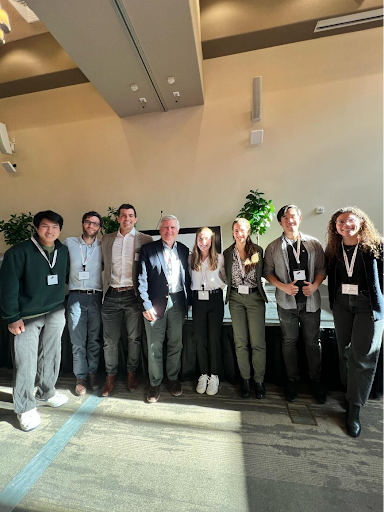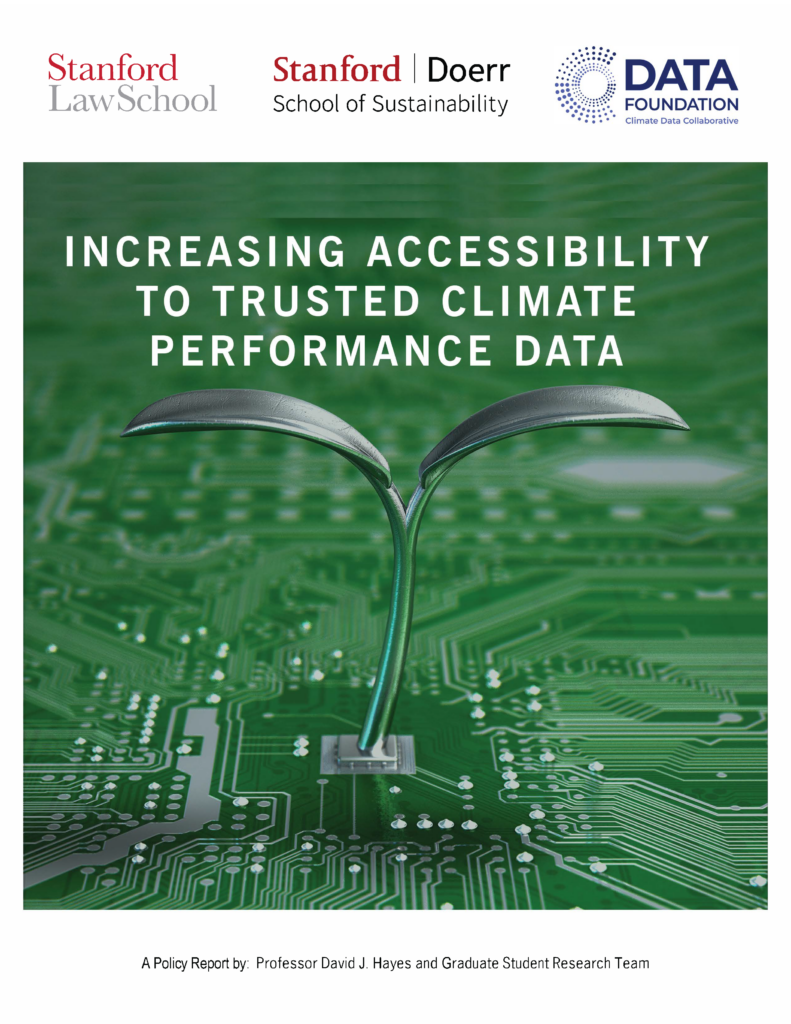
Trusted Climate Data for Effective Policy: A Roadmap for Action
By: Victor Y. Wu, Oliver Edelson, and Allison Weinstock
Ambitious governmental, corporate, and market pledges to cut carbon emissions can be fulfilled only with access to trusted climate data. Climate action today is hindered not only by insufficient intent but also by unreliable and inaccessible information. Policymakers, companies, and investors need trusted, high-quality climate performance data to prioritize the most effective solutions.
Over the winter quarter, we researched the issue of inadequate climate data as part of a Stanford Law and Policy Lab course titled “Bridging the Climate Data & Decision-Making Divide,” taught by Professor David J. Hayes. The lab brought together students from law, policy, engineering, business, and sustainability programs to tackle the following question: How can we make climate performance data more accurate, accessible, and actionable?
Our work culminated in a major policy report, Increasing Accessibility to Trusted Climate Performance Data, and a conference at Stanford on March 13, 2025. The conference convened academic leaders, investors, sustainability and technology professionals, nonprofit advocates, and government officials for a focused discussion on data gaps in climate performance tracking—and strategies to close those gaps.
The Problem of Poor Climate Data
Climate data exists in abundance. Thousands of corporations publish greenhouse gas inventories. Satellite systems collect remote sensing data daily. Voluntary carbon markets issue credits for reforestation and methane abatement. Yet this information is often fragmented, unverifiable, or gated—held behind paywalls or proprietary guards that limit access. Therefore, it is poorly suited for real-world decision-making, especially directing capital toward the most effective solutions.
In our research, we found that corporate carbon disclosures often rely on generalized models and spend-based estimates. While these approaches may meet basic compliance requirements, they rarely reflect the actual impact of specific emissions reduction investments. Meanwhile, many carbon credits on voluntary markets lack robust, auditable measurement, reporting, and verification (MRV) standards, raising questions about their legitimacy.
The consequences of weak data are far-reaching. Capital may be directed to ineffective or even counterproductive projects. Regulatory efforts may be stymied by a lack of defensible metrics. Genuine solutions may struggle to gain traction without access to trusted, transparent benchmarks. And ultimately, public trust—in both public and private climate action—may erode.
Four High-Impact Use Cases
Our lab focused on four priority areas where improved data practices could drive immediate impact:
- Methane Emissions: Methane is responsible for about 30% of global warming to date and is 80 times more potent than carbon dioxide (CO2) over 20 years. We explored MRV challenges and opportunities across the oil and gas, landfill, and agricultural sectors.
- Hybrid Carbon Dioxide Removals (CDR): Engineered solutions like biochar, biomass with carbon capture and storage, and enhanced rock weathering are gaining traction but lack standardized protocols and data sharing conventions.
- Forest Carbon Interventions: Although reforestation and other improved forest management practices can improve carbon stocks, the lack of measurement and monitoring standards has opened the door to inflated carbon claims. New satellite and sensor technologies offer hope for better accounting of forest carbon gains.
- Urban CO2 Emissions: Local governments need user-friendly, disaggregated emissions data to target reductions in transportation, building energy use, and industrial activity.
For each use case, we proposed pilot initiatives to bring stakeholders together around common data standards, shared taxonomies, and open-access platforms.
The Conference
Our research directly shaped the agenda for the March 2025 conference Improving Accessibility to Trusted Climate Performance Data, co-hosted by Stanford Law School, the Stanford Doerr School of Sustainability, the Stanford Woods Institute, CodeX, and the Data Foundation.
With the federal government aggressively retreating from its leadership role on climate action, the conference emphasized the increasing importance of subnational governments, academic institutions, and the private sector in developing reliable climate data infrastructure. The conference focused not only on diagnosing issues but also on collaboratively creating practical, scalable, and sustainable solutions, including learning from other sectors.
Highlights included:
- Investor, Corporate Reporting, and Data Management Perspectives: Three panels of investor, carbon corporate reporting and data management experts emphasized that (1) trusted project-level GHG performance data is essential for scaling key climate solutions; (2) entity-level corporate carbon disclosure conventions are not designed for this task; and (3) a key is to develop investor- and accounting-grade data management approaches that meet user needs. Panelists included highly successful climate tech investors, Nancy Pfund (DBL Partners) and Jane Woodward (WovenEarth Ventures); corporate carbon disclosure and accounting experts, Catherine Atkin (Stanford CodeX Climate Data Policy Initiative) and Liv Watson (Capitals Coalition); and data management experts, Julia Lane (NYU Professor Emerita) and Nick Hart (Data Foundation CEO).
- Health Data as a Model: Dr. Sam Volchenboum (U. of Chicago) and Dr. Mark Musen (Stanford University) shared lessons from rare disease research and biomedical data governance, highlighting how the healthcare sector overcame many of the same barriers that climate data efforts still face today.
- Methane MRV Advances: Top methane scientists from Stanford (Rob Jackson), the Environmental Defense Fund (Steven Hamburg) and the Global Methane Hub (Chris Konek), moderated by Sonia Wang from the Data Foundation, discussed how remote sensing can enhance verification across oil and gas, landfills, and agriculture.
- Forest Data Integrity: Speakers from American Forests (Jad Daley), Stanford’s Woods Institute for the Environment (Chris Field), Vibrant Planet (Ashley Conrad-Saydah) and moderator Lauren Cooper from the Sustainable Forestry Initiative addressed longstanding concerns over forest carbon credits and explored how new technologies and standards can restore credibility.
- Carbon Dioxide Removal: Representatives from Lowercarbon Capital (Ryan Orbuch), Stanford’s Doerr School of Sustainability (Kate Maher), the Carbon Removal Standards Initiative (Anu Khan) and moderator David J. Hayes highlighted how many investors and start-ups are balancing risk amid incomplete data, particularly in emerging carbon removal applications, while pushing for more transparent, standardized approaches to quantify and confirm positive atmospheric impacts.
Participatory Workshop: Conference attendees contributed positive ideas for developing sector-specific protocols and data-sharing platforms, and exploring how interoperable tools and shared taxonomies could accelerate progress.

The Report
We then incorporated insights from the conference into our report. Titled Increasing Accessibility to Trusted Climate Performance Data, the report offers a comprehensive assessment of the current climate data landscape and presents targeted recommendations across the four use cases. It emphasizes the role of open standards, modern data infrastructure, and public-private collaboration in building a more trustworthy foundation for climate performance tracking.

Given our interdisciplinary backgrounds in law, policy, engineering, business, and sustainability, we each brought different perspectives to the project. Students with domain expertise helped identify technology trends, map regulatory frameworks, and evaluate feasibility for data standardization in each of the identified focus areas. Ultimately, we developed case-specific recommendations for methane, forest carbon, CDR, and urban CO2 emissions.
Toward a Data Commons for Climate Action
At a time when climate leadership is increasingly shifting to the state and local levels, momentum is building from the ground up for a trusted climate data infrastructure. State governments are stepping up on disclosure laws, regional collaboratives are piloting new MRV approaches, philanthropy is backing open data infrastructure, and startups are making climate monitoring more real-time and reliable. Our report lays out a vision for how these efforts can coordinate—through open standards, shared tools, and a commitment to public interest—to build the trustworthy climate data systems we need. Because better data means smarter decisions, stronger accountability, and a real shot at hitting our climate goals.
Leave a Comment